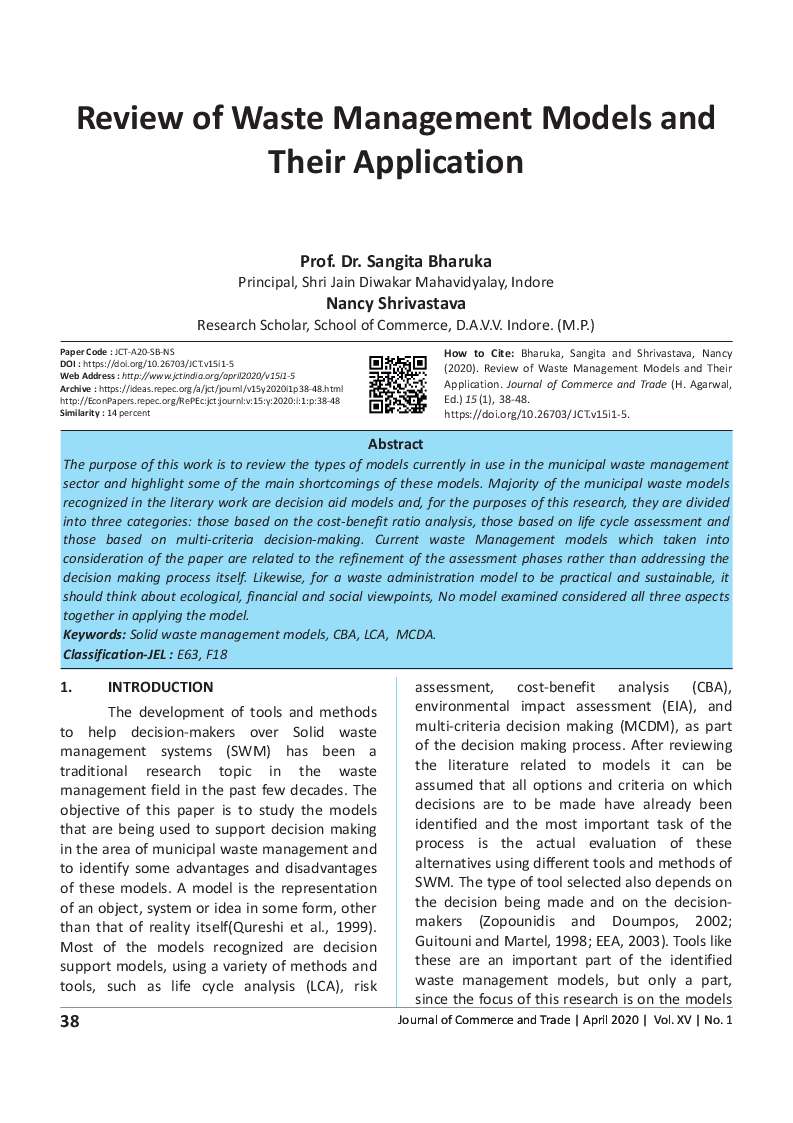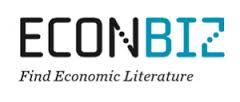Review of Waste Management Models and Their Application
DOI:
https://doi.org/10.26703/jct.v15i1.51Keywords:
Solid Waste Management, CBA, LCA, MCDAAbstract
The purpose of this work is to review the types of models currently in use in the municipal waste management sector and highlight some of the main shortcomings of these models. Majority of the municipal waste models recognized in the literary work are decision aid models and, for the purposes of this research, they are divided into three categories: those based on the cost-benefit ratio analysis, those based on life cycle assessment and those based on multi-criteria decision-making. Current waste Management models which taken into consideration of the paper are related to the refinement of the assessment phases rather than addressing the decision making process itself. Likewise, for a waste administration model to be practical and sustainable, it should think about ecological, financial and social viewpoints, No model examined considered all three aspects together in applying the model.
Classification-JEL: E63, F18
Downloads
References
Ayalon, O., Avnimelech, Y., Shechter, M., 2000. Application of a comparative multidimensional life cycle analysis in solid waste management policy: the case of soft drink containers. Environmental Science & Policy 3, 135–144.
Baetz, B.W., Neebe, A.W., 1994. A planning model for the development of waste material recycling programmes. Journal of the Operational Research Society 45 (12), 1374–1384.
Bana E Costa, C. A., Stewart, T.J., Vansnick, J.C., 1997. Multi-criteria decision analysis: Some thoughts based on the tutorial and discussion sessions of the ESIGMA meetings. European Journal of Operational Research 99, 28–37.
Barton, J.R., Dalley, D., Patel, V.S., 1996. Life cycle assessment for Waste Management. Waste Management 16 (1–3), 35–50.
Berger, C., Savard, G., Wizere, A., 1999. EUGENE: an optimization model for integrated regional solid waste management planning. Int. J. Environment and Pollution 12 (2/3), 280–307.
Berkhout, F., Howes, R., 1997. The adoption of life cycle approaches by industry: patterns and impacts. Resources, Conservation and Recycling 20, 71–94.
Bjorklund, A., Dalemo, M., Sonesson, U., 1999. Evaluating a municipal waste management plan using ORWARE. Journal of Cleaner Production 7, 271–280.
Boyle, D.J.K., 1989. Comprehensive Solid Waste Planning strategies. Journal of Resource Management and Technology 17 (4), 193–199.
Brans, J.P., Macharis, C., Kunsch, C.P.L., Chevalier, A., Schwaninger, M., 1998. Combining multicriteria decision aid and system dynamics for the control of socio-economic processes. An iterative real-time procedure. European Journal of Operational research 109, 428–441.
Carlsson, C., Walden, P., 1995. AHP in political group decisions: a study in the art of possibilities. Interfaces 25 (4), 14–29
Chang, N.-B., Wei, Y.L., 1999. Strategic planning of recycling dropoff stations and collection network by multiobjective programming. Environmental Management 24 (2), 247–263.
Chang, S.H., Li, Z., 1997. Use of a computer model to generate solid waste disposal alternatives. Journal of solid waste technology and management 24 (1), 9–18.
Clift, R., Doig, A., Finnveden, G., 2000. The application of life cycle assessment to integrated solid waste management. Trans IChemE 78 (B), 279–287.
Courcelle, C., Kestmont, M.P., Tyteca, D., 1998. Assessing the economic and environmental performance of municipal solid waste collection and sorting programmes. Waste Manage Res. 16 (3), 253– 263.
Craighill, A.L., Powell, J.C., 1996. Life cycle assessment and economic evaluation of recycling: a case study. Resources, Conservation and Recycling 17, 75–96.
Daskalopoulos, E., Badr, O., Probert, S.D., 1998. An integrated approach to municipal solid waste management. Resources, Conservation and Recycling 24, 33–50.
Ekvall, T., 1999. Key methodological issues for life cycle inventory analysis of paper recycling. Journal of Cleaner Production 7, 281–294.
Englehardt, J.D., Lund, J.R., 1990. Economic analysis of recycling for small municipal waste collectors. Journal of Resource Management and Technology 18 (2), 84–96.
EPA, 2003. National Waste Database, for 2001. Environmental Protection Agency, Ireland.
EPIC and CSR, 2000. Integrated Solid Waste Management Tools: Measuring the Environmental Performance of Waste Management Systems. Environment and Plastics Industry Council and Corporations supporting recycling.
ERRA, 1999. The Case for Integrated Waste Management, a briefing paper. European Recovery and Recycling Association.
Esmaili, H., 1972. Facility selection and haul optimisation model. Journal of the Sanitary Engineering Division, ASCE December 1005–1021.
EUROPEN, 1996. Use of Lifecycle Assessment (LCA) as a policy tool in the field of packaging waste management—a discussion paper. EUROPEN 1999.
Finnveden, G., 1999. Methodological aspects of life cycle assessment of integrated solid waste management systems. Resources, Conservation and Recycling 26, 173–187.
Finnveden, G., Ekvall, T., 1998. Life Cycle assessment as a decision support tool—the case of recycling versus incineration of paper. Resources, conservation and recycling 24, 235–256.
Fuertes, L., 1974. Solid Waste Management: equity trade off models. Journal of the urban planning and development division, ASCE November 155–171.
Gabola, S., 1999. Towards a sustainable basis for the EU Packaging and Packaging Waste Directive. In: ERRA Symposium November, Brussels.
Gottinger, H.W., 1988. A computational model for solid waste management with application. European Journal of Operational Research 35, 350–364.
Guitouni, A., Martel, J., 1998. Tentative guidelines to help choosing an appropriate MCDA method. European Journal of Operational Research 109, 501–521.
Haastrup, P., Maniesso, V., Mattarelli, F., Mazzeo Rinaldi, F., Mendes, I., Paruccini, M., 1998. A decision support system for urban waste management. European Journal of operational research 109, 330–341.
Harrison, K.W., Dumas, R.D., Solano, E., Barlaz, M.A., Brill, E.D.,Ranjithan, S. R., 2001. Decision support for life cycle based solid waste management. Journal of Computing in Civil Engineering January, 44–58.
Hummel, J., 2000. What does it cost to recycle household waste. Warmer Bulletin 75, 3–5.
ISO 14040:1997, 1997. Environmental Management—Life Cycle Assessment—Principles and Framework (ISO 14040:1997). International Standards Organisation, Geneva.
ISO 14041:1998, 1998. Environmental management—Life Cycle assessment—Goal and Scope Definition and inventory analysis
(ISO: 14041). International Standards Organisation, Geneva.
ISO 14042:2000, 2000. Environmental Management—Life Cycle assessment—Life Cycle Impact Assessment (ISO 14042:2000). International Standards Organisation, Geneva.
ISO 14043:2000, 2000. Environmental Management—Life Cycle Assessment—Life Cycle Interpretation (ISO 14043:2000). International Standards Organisation, Geneva
Keeney, R., Raiffa, H., 1976. Decisions with Multiple Objectives: Preferences and Value Tradeoffs. Wiley, New York.
Lai, V.S., Wong, B.K., Cheung, W., 2002. Group decision making in a multiple criteria environment: a case using the AHP in software selection. European Journal of Operational research 137, 134–144.
MacDonald, M., 1996a. Solid Waste Management models: a state of the art review. Journal of solid waste technology and management 23 (2), 73–83.
MacDonald, M.L., 1996b. A Multi-attribute spatial decision support system for solid waste planning. Comput., Environ., and Urban Systems 20(1), 1–17.
MCCK and Consultancy, 1998. Waste Management, A Strategy for Dublin. Local Authorities, Dublin.
McDougall, F., White, P., Franke, M., Hindle, P., 2001. Integrated Solid Waste Management: A Life Cycle Inventory. Blackwell Science, London.
Motameni, R., Falcone, T., 1990. The application of Martin Fishbein's theory of reasoned action in solid waste management and recycling. Journal of Resource Management and Technology 18 (3&4), 144–150.
Petts, J., 2000. Municipal waste management: inequities and the role of deliberation. Risk Analysis 20(6), 821–832.
Powell, J., 2000. The potential for using life cycle inventory analysis in local authority waste management decision making.Journal of Environmental Planning and Management 43 (3), 351–367.
Qureshi, M.E., Harrison, S.R., Wegener, M.K., 1999. Validation of multicriteria analysis models. Agricultural Systems 62, 105–116.
RDC and PIRA, 2003. Evaluation of costs and benefits for the achievement of reuse and recycling targets for the different packaging materials in the frame of tge packaging and packaging waste directive 94/62/EC. EU Commission.
Rogers, M., 2001. Engineering Project Appraisal. Blackwell Science, London.
Rogers, M., Bruen, M., 1998a. Choosing realistic values of indifference, preference and veto thresholds for use with environmental criteria within ELECTRE. European Journal of Operational Research 107, 542–551.
Rogers, M., Grist, B., 2001. Sidelining politicians and community groups: the site selection process for a non-hazardous landfill facility in County Galway. Municipal Engineer 145 (2), 1–4.
Roy, B., 1991. The outranking approach and the foundations of ELECTRE methods. Theory and Decision 31 (1), 49–73.
Saaty, T.L., 1980. The Analytic Hierarchy Process. McGraw Hill, New York.
Salminen, P., Hollanen, J., Lahdelma, R., 1998. Comparing multicriteria methods in the context of environmental problems. European Journal of Operational Research 104, 485–496.
Siskos, Y., 1999. Intelligent multicriteria decision support: overview and perspectives. European Journal of Operational Research 113, 236–246.
Smith, D.G., Baetz, B.W., 1991. A comprehensive costing methodology for the assessment of solid waste management alternatives. Journal of Resource Management and Technology 19 (4), 140–147.
Sudhir, V., Muraleedharan, V.R., Srinivasan, G., 1996. Integrated solid waste management in urban India: a critical operational research framework. Socio-Econ. Plann. Sci. 30(3), 163–181.
Sundberg, J., Gipperth, P., Wene, C.D., 1994. A systems approach to municipal solid waste management: a pilot study of Goteborg. Waste Management and Research 12 (1), 73–91.
Takeda, E., 2001. A method for multiple pseudo-criteria decision problems. Computers and Operations Research 28, 1427–1439.
Tanskanen, J.-H., 2000. Strategic planning of municipal solid waste management. Resources, Conservation and Recycling 30, 111– 133.
Truitt, M., Liebnman, J., Kruse, C., 1969. Simulation model of urban refuse collection. Journal of the sanitary engineering division April,289–298.
Van Huylenbroeck, G., 1995. The conflict analysis method: bridging the gap between ELECTRE, PROMETHEE and ORESTE. European Journal of Operational Research 82, 490–502.
Warmer Bulletin, 2000. Environmental impacts of transporting waste—life cycle and cost benefit assessments. Warmer Bulletin 73, 8–10.
White, P., Franke, M., Hindle, P., 1995. Integrated Solid Waste Management. Blackie Academic & Professional, London.
Zeleny, M., 1982. Multiple Criteria Decision Making. McGraw Hill, New York.
Zopounidis, C., Doumpos, M., 2002. Multicriteria classification and sorting methods: a literature review. European Journal of Operational Research 138, 229–246.

Downloads
Published
License
Copyright (c) 2020 Prof. (Dr.) Sangita Bharuka, Nancy Shrivastava

This work is licensed under a Creative Commons Attribution 4.0 International License.










